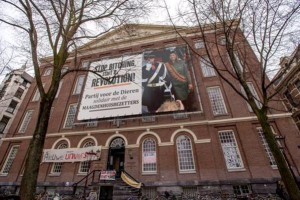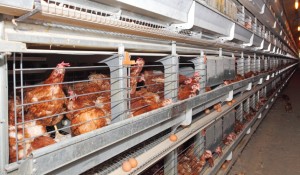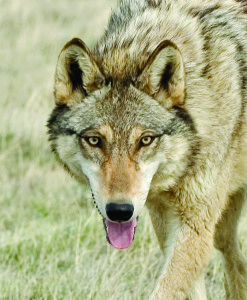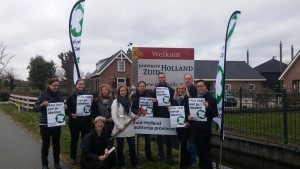Worldlog Semana 12 – 2015
Esta semana ha tenido lugar en Amsterdam el estreno internacional de nuestro nuevo documental, One Single Planet, y el pasado fin de semana se proyectó en diez ciudades holandesas, lo cual nos llena de orgullo. One Single Planet es un documental sobre los grandes problemas de sostenibilidad que amenazan a nuestro planeta, pero también sobre las posibles soluciones para que la Tierra siga siendo un lugar habitable para las próximas generaciones.
Para la película hablé con científicos prominentes, responsables políticos y pensadores. Toman la palabra, entre otros, Vandana Shiva, el catedrático Arjan Hoekstra, Hilal Elver (relatora especial sobre el derecho a la alimentación de las Naciones Unidas), y los catedráticos Hans Zaaijer y Jan Willem Erisman. Partiendo de cuatro grandes temas —el problema de la alimentación mundial (1), la crisis hídrica internacional (2), la zoonosis (3) y la cuestión de la biodiversidad (4)—, los científicos reflexionan sobre las causas y posibles soluciones a las distintas crisis que atenazan al mundo. Consideramos un gran honor que nuestro documental se estrenara en el edificio universitario Het Maagdenhuis, ocupado en este momento por estudiantes que protestan contra los recortes en educación y el carácter antidemocrático de la toma de decisiones en las universidades. Una señal esperanzadora de una generación de jóvenes que ya no están dispuestos a seguir contemplando impasibles cómo esquilman nuestro planeta.
El documental ya se puede ver en neerlandés en www.onesingleplanet.nl, y dentro de poco estará disponible en inglés.
El año pasado, Holanda sufrió una epidemia de gripe aviar y hubo que sacrificar a millones de animales. El último brote se produjo a finales del año pasado, pero la crisis aviar ha vuelto a azotar a nuestro país. La semana pasada se constató la presencia de gripe aviar en una granja del municipio holandés de Barneveld y como medida preventiva se van a sacrificar 30.000 pollos, introduciéndolos vivos en bolsas y gaseándolos en su interior. Por lo visto, es más importante mantener bajo el precio de huevos y muslos de pollo que el bienestar animal y los riesgos para la salud pública…
Además de los pollos de Barneveld, me preocupan los pollos clorados de Estados Unidos, que podrían conseguir acceso al mercado europeo próximamente. La propuesta de levantar el veto a la importación de pollos clorados me parece un ejemplo del efecto negativo que las negociaciones sobre el tratado de libre comercio TTIP están teniendo ya sobre la normativa europea, por lo que he planteado inmediatamente una serie de preguntas parlamentarias al respecto.
Pero por fortuna también tengo buenas noticias: ¡se ha vuelto a avistar un lobo en Holanda! Por desgracia estuvo aquí muy poco tiempo y ya ha vuelto a cruzar la frontera con Alemania. Pero la presencia del lobo en nuestra tierra sería una gran contribución a la biodiversidad. Holanda ha perdido mucha biodiversidad y el lobo ayudaría a que la naturaleza estuviera más completa, puesto que un gran depredador como él desempeñaría una función esencial en nuestro ecosistema. Esperemos que el lobo avistado vuelva a nuestro país acompañado por una manada.
En el marco de las elecciones provinciales del 18 de marzo, he participado en una protesta contra el lobby de la caza en la provincia de Holanda Meridional. La caza constituye un tema importante en las elecciones provinciales. Junto a Carla van Viegen, nuestra cabeza de lista para Holanda Meridional, ya he declarado a esta provincia de forma simbólica como región libre de caza. También he asistido a protestas contra la caza en las provincias de Overijssel y Utrecht.
El próximo miércoles es el gran día de las elecciones. Las encuestas nos auguran buenos resultados y podemos contar con obtener representantes en todas las provincias en las que nos presentamos. Unos días más de campaña intensa y ya podemos ir a votar. La semana que viene volveré con los resultados.
Saludos,
Marianne
Our new documentary One Single Planet had its world premiere in Amsterdam last week and was shown in 10 towns in the Netherlands last weekend. Very proud! One Single Planet is a documentary about the major sustainable problems threatening our planet. But it is also a documentary about the solutions to keep the earth habitable for future generations.
For this film, I spoke with leading scientists, policy-makers and thinkers. Speakers include Vandana Shiva, professor Arjan Hoekstra, United Nations food rapporteur Dr. Hilal Elver, professor Hans Zaaijer and professor Jan Willem Erisman. Based on four themes, the world food problem (1), the world water crisis (2), zoonoses (3) and the biodiversity problem (4), scientists think together about causes of, and possible solutions for, the crises that keep the world in its grip. It was a great honour that our documentary was allowed to have its premiere in the Maagdenhuis university building, which is currently occupied by students who are protesting against cuts backs on education and the undemocratic nature of universities. A hopeful sign from a young generation that no longer stands by while the destruction continues.
The film can already be seen in Dutch on the website www.onesingleplanet.nl. Soon also in English!
Last year, the Netherlands were plagued by a bird flu epidemic. Millions of animals in the poultry sector were killed. The most recent bird flu outbreak occurred at the end of last year, but now fate has struck again. Last week, there was a bird flu outbreak on a farm in the Dutch municipality of Barneveld. 30,000 chickens will be killed as a precaution. The chickens will be put in bags while they are still alive and then be gassed in the bags. Cheap eggs and chicken legs are apparently more important than animal wellbeing and the risks to human health…
In addition to worrying about the chickens in Barneveld I also worry about chlorine chickens, because American chlorine chickens are likely to be admitted to the European market. The intention to lift the import ban on chlorine chickens which is currently still in place seems to me an example of how negotiations on the TTIP free trade agreement already have a visibly negative effect on European standards. I have therefore immediately asked Parliamentary questions about this.
Fortunately, I also have good news. The wolf has been spotted again in the Netherlands! Unfortunately, he was only here for a short while and now he has crossed the border with Germany again. But wolves in the Netherlands would make a substantial contribution to our biodiversity. The Netherlands have lost a lot of biodiversity and the wolf would make nature in the Netherlands much more complete. A major predator such as the wolf could play a key role in our ecosystem. Hopefully, he will come back into our country, together with more wolves, in a pack.
In the context of the Provincial Council elections on 18 March, I participated in a protest against leisure hunting in the province of South Holland. Leisure hunting is a major topic in the Provincial Council elections. Together with Carla van Viegen, our leading candidate for the province of South Holland, I already declared the province symbolically hunt-free! Also, I went to the provinces of Overijssel and Utrecht to protest against hunting.
Next Wednesday is big election day. We are doing well in the polls and we can count on seats in all of the provinces in which we participate. Another few days of fervent campaigning and then the time has come. Next week, I will of course share the outcome.
Yours sincerely,
Marianne



